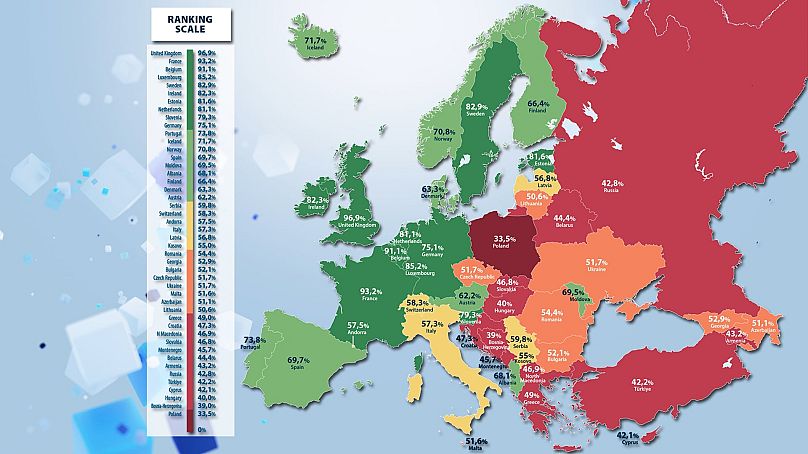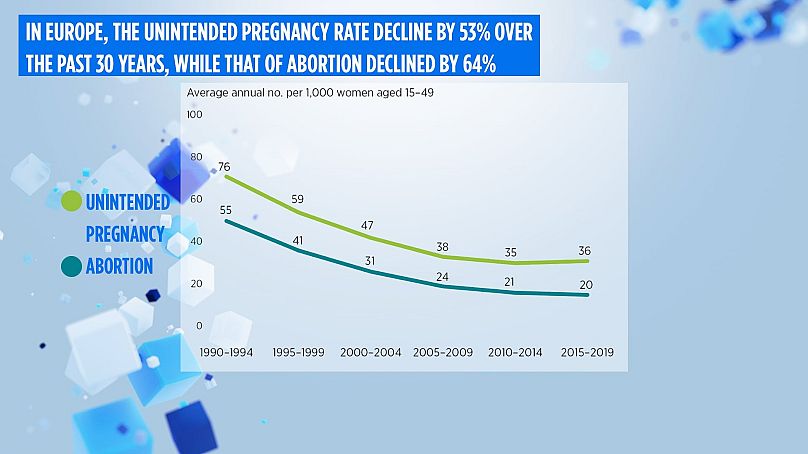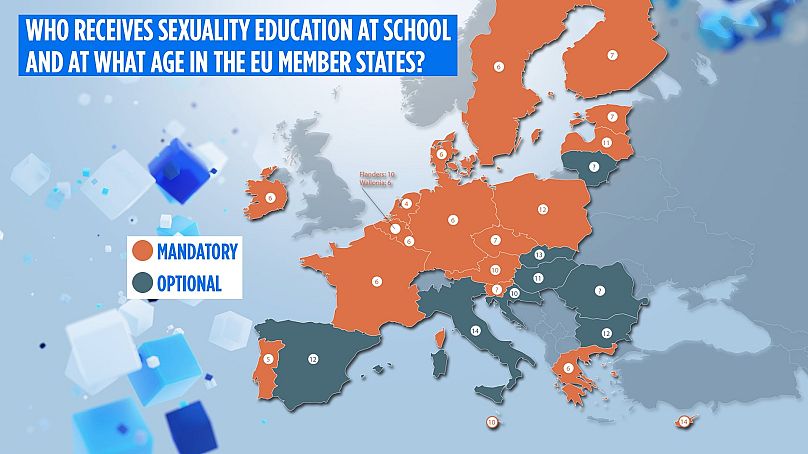On International Condom Day, Euronews takes a closer look at public policies governing contraception in Europe and asks the experts why differences exist between the Member States.
Contraception is known to prevent unwanted pregnancies and, in the case of condoms, protect against sexually transmitted infections (STIs). When it comes to contraceptives, male and female condoms are the most effective barriers to STIs including HIV, according to the WHO and the European Centre for Disease Prevention and Control.
 ADVERTISEMENT
ADVERTISEMENT
 ADVERTISEMENT
ADVERTISEMENT
So, on International Condom Day, 2023, why is there still such disparity in access to contraception around Europe?
The European Parliament encourages safeguarding access to contraception. As recently as 2021, a parliamentary report on sexual and reproductive health stressed that all member states are encouraged to provide universal access to contraceptive methods and address any barriers.
Yet government policies across the European Union continue to vary.
Financial inequality between western and eastern member states is believed to be part of the problem. Neil Datta, Executive Director of the European Parliamentary Forum for Sexual and Reproductive Rights told Euronews: "In east European countries, up until the early 1990s, contraception was not very well known, it was not very accessible so, we are still dealing with the legacy of that even today."
Recommendations
The AIDS Healthcare Foundation has designated 13 February as International Condom Day. It says the event was created to encourage safer sexual practices on an international scale and promote the use of contraception to prevent unintended pregnancies and STIs.
The EU mirrors this message and has also called on public authorities to ensure students in schools are given a rounded education on sexual health. It calls for professional counselling to be provided on a range of contraceptive methods in line with standards set by the World Health Organization.
But, these are recommendations and the 27 Member States are not obliged to act on them.
"Governments have not been very proactive in thinking about their policies in relation to contraception," said Datta. He went on to explain that some countries are also against wider contraception policies, based on the idea that encouraging the use of contraception will have a negative impact on fertility rates.
‘Best accessibility’
The Contraception Policy Atlas, designed by the European Parliamentary Forum for Sexual and Reproductive Rights, breaks down contraception policies in 46 countries across Europe. Its findings suggest that France has the best access to contraception, counselling and the highest availability of online information services out of all EU Member States. Accessibility was rated at 93.2%.
France announced its pharmacies would provide free condoms to people aged 18-25 from January 2023 after health authorities discovered that the number of STIs in France increased by 30% in both 2020 and 2021. A programme providing free STI testing and the emergency contraceptive pill has also been rolled out.
In Ireland, free condoms are available to people of all ages through sexual health clinics and some third-level colleges. In addition, from 1 September 2023, free contraception will be given to 16-year-old girls and to women between the ages of 26 and 30 as part of the national budget. The national health service has also announced it will spend €500,000 on condoms and lubricants as part of an ongoing campaign against "crisis pregnancies" and STIs – amounting to 1.5 million free condoms every year.
Germany also announced that it wants to follow France’s lead and finance condoms through its national health insurance. For now, though, contraception comes at a cost through the national health scheme, although special provisions cover birth control pills and emergency contraception for adolescents up to the age of 22.
‘Lowest accessibility’
The Contraception Policy Atlas puts Poland at the opposite end of the scale, with a rating of just 33.5% in terms of public access to contraception. Emergency contraceptive pills need to be prescribed by a doctor and are not available over the counter in pharmacies.
Meanwhile, in Hungary, there is no publicly-funded website for contraception services and a prescription is needed for all contraceptive supplies except condoms and emergency contraception.
Role of politics and religion
"Policies on contraception influence people's behaviours in accessing contraception. One aspect is whether it is covered by the respective national health system. If it is not covered by the national health systems then it creates financial barriers for individuals who want to use it" said Datta.
Religion is also an important factor, "most religions, Christian religions specifically, do discourage the use of contraception, particularly in the world of Catholicism.
"So where those religions are very strong, the narratives out there which do discourage the use of contraceptives and religious actors can have influence over public policies" he added.
The right kind of sex education
Yet, in Europe as a whole, the unintended pregnancy rate has declined by 53% over the past 30 years, according to the Guttmacher Institute.
Some experts argue that one of the factors behind declining unintended pregnancy rates is the promotion of sex education in schools, which is widely encouraged by the European Parliament and the World Health Organization.
"Comprehensive sexuality education teaches young people both about contraception and about respect and consent within relationships including sexual relationships. This has a very positive knock-on effect on people understanding how to prevent unintended pregnancies and how to protect their own health by being able to empower themselves to avoid sexually transmitted infections" said Datta.
Sex education remains a topical issue. In some countries, such as Ireland and France, it is a compulsory part of school education, but in Italy, for example, sex ed is optional.
Where available, education is often delivered through a variety of school subjects as part of a cross-curricular programme. Various aspects are taught through biology, home economics and social sciences.
Yet sex education does not necessarily provide students with information on contraception methods.
Natalie Picken, an analyst for the RAND Corporation, a non-profit specialising in improving policy and decision-making through research, told Euronews that education on contraception is only included in the sex education curriculum in some EU countries.
"It is likely that the content, nature and extent of these programmes varied considerably between regions, schools, and classes” she added.
Picken’s research found that most EU members have limited teacher training opportunities in sex education, despite its benefits.
“There is strong evidence that sexuality education can lead to reduced risk-taking, delayed initiation of sexual intercourse, and more use of contraception and condoms and generally improves young people's knowledge and attitudes around sexual health,” she said.
How can EU countries bridge the gap?
Implementing better access to contraception can be costly but there are ways authorities can get up to speed.
"One easy quick fix that is accessible to any government would be to provide government supported information for example via a website which provides authentic, authoritative information... that is within the capacity of each government no matter how strapped it may be", concluded Datta.













